Cannes gives graduate students immersion into film industry
At Lipscomb, the city of Nashville is our campus and the world is our classroom. For graduate cinematic arts students, the famed Cannes Film Festival was their classroom to learn about the film industry.
Kim Chaudoin |
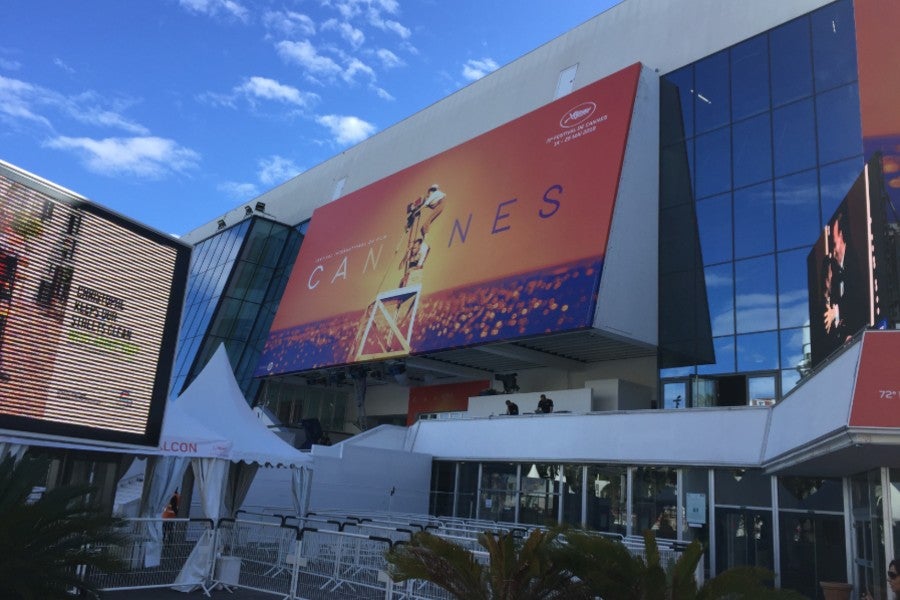
Graduate cinematic arts students have a unique opportunity to experience Cannes each May.
For the film industry there is no more important place on the planet to be — ever — than Cannes in May.
And that’s just where 22 graduate students in Lipscomb’s cinematic arts program, housed in the George Shinn College of Entertainment & the Arts, were from May 14-23 for an immersion into the premiere market in the industry.
Led by Dave DeBorde, associate professor of film and creative media; along with Tom Bancroft, head of Lipscomb’s animation program; and Chad Pelletier, an adjunct cinematic arts professor; Lipscomb’s graduate students experienced the essence of the annual Cannes Film Festival — the Marché du Film, the world’s film market.
The Marché du Film is the largest international gathering of film professionals. More than just an event, for the past 60 years, the Marché has been one of the key stepping stones in the creation, production and distribution of films around the world. Thousands of films are shown at the Marché du Film, and professionals from across the globe obtain financing, seize opportunities, network, take the pulse of international film creation and are at the forefront of innovation throughout the hundreds of events that take place during this festival.
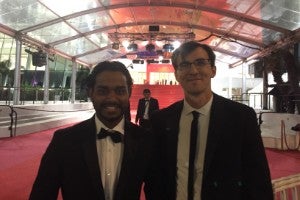
Students Praisim Peter, left, and Chris Capp on the red carpet in Cannes.
“The Marché du Film is planet Earth’s film market,” says DeBorde, who has led Lipscomb’s global learning program to Cannes the last five years. “Everyone is there because everyone is there. What people outside of the industry may not realize is that at least 70 percent of the world’s film business happens during this ten-day portion of the overall Cannes event each year.”
DeBorde, a veteran producer and filmmaker, has made the annual pilgrimage to Cannes for decades and has expanded the borders of the Lipscomb classroom for film students by designing a global study course that gives students a unique opportunity to engage in this film market through strategic assignments, reflection essays, attending panel presentations and film screenings, networking, attending events and observing the daily activity at Cannes.
While other film programs across the country may have travel study courses in Cannes, Lipscomb’s program is unique in that DeBorde registers students not as college students but as film professionals.
“Our students are all film professionals who are working in the field on various projects at the same time they are enrolled in our graduate program,” says DeBorde. “So not only does registering as film professionals give our students better access to the activities and events at Cannes, they have real projects that they can make connections on while they are there as well.”
Students prepare for the travel course to Cannes throughout the preceding spring semester. DeBorde meets with students to prepare them for what to expect and how to maximize their time at Cannes. Each student also created a personal website that highlights their professional experience, current projects and other career information to establish themselves as film professionals. They also receive assignments and course expectations before they head to France and have discussions about panel discussions to attend and other don’t-miss activities and events.
The Marché du Film is planet Earth’s film market. Everyone is there because everyone is there. What people outside of the industry may not realize is that at least 70 percent of the world’s film business happens during this ten-day portion of the overall Cannes event each year. — Dave DeBorde, associate professor of film and creative media
Network. Network. Network.
DeBorde traditionally arrives in Cannes a day before the delegation of graduate filmmakers to get final details in place prior to their arrival. During their stay, students live in apartments and often shop at local markets to buy groceries to prepare meals while in country. DeBorde says it gives students an opportunity to experience living in a different culture in addition to what they are learning about the film industry.
“In our group this summer we had three graduate students who also went on this trip last summer, but we also have a student who had not been to Europe before this trip and another one who had not flown before,” he recalls. “There are so many rich learning opportunities through this experience.”
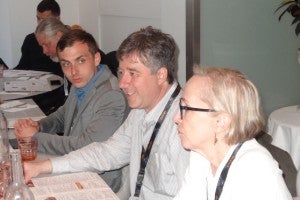
Student Tyler Oaks, left, meets with filmmakers in Cannes.
From the moment the students arrive in Cannes, DeBorde orchestrates opportunities for students to network with seasoned film professionals. After a walking tour of Cannes to highlight the history of the city and to familiarize students with the layout of the festival, the group met for dinner at La Pizza Cresci, a popular spot in the city. DeBorde invited 15 industry professionals from New York City, Los Angeles, London and Paris to join the Lipscomb students for dinner.
“The networking starts right away,” says DeBorde. “If you’re not networking in Cannes, you are wasting your time.”
The Marché du Film provides students with multiple opportunities to network with filmmakers, producers, actors and other industry experts in addition to thousands of film screenings, panel discussions and numerous other activities.
“Over the course of my trip to Cannes I was able to do a good bit of networking. Ultimately the entire trip was based on networking,” says student Lea Johnson. “After being in Cannes a few days I quickly realized that networking would be a part of my daily schedule. With me being an extrovert I knew it would be very uncomfortable for me to be talking to people and such. But it definitely became easier. I literally found myself doing role play with some of my classmates to practice networking and staying calm in ‘awkward’ conversations.”
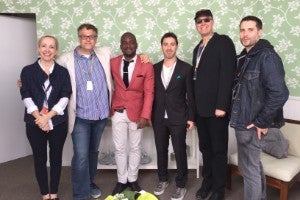
Panelists Lizzy Bentley (producer, A Hidden Life), Deborde, Ramfis Myrthil (producer, Mary Pickford biopic), Joe Belcastro (vice president of creative content, WWE), Bancroft and Ryland Aldritch (producer, entertainment journalist).
Lipscomb faculty as industry experts
Each year during the film festival, the American Pavilion hosts panel discussions featuring acclaimed actors, innovative filmmakers, independent film trailblazers and headline making journalists. This year experts shared their experience and insight in the “Industry In Focus” Series and “In Conversation” programming. Lipscomb was well represented in those discussions.
Bancroft was one of four industry experts featured in the “Industry In Focus: The Future of Crowdfunding” session that examined the practice of raising money online and what’s next on the horizon. DeBorde moderated the “Industry In Focus: It’s Called Show Business” session, featuring a panel of experts discussing independent film financing. Among the panelists were an Oscar-nominated producer, veteran producers, an attorney and finance expert.
DeBorde also moderated the “Industry In Focus: The Art of the Pitch” session which featured Bancroft as an expert panelist along with four other industry leaders in a conversation about best practices for pitching projects to investors, potential partners and other gatekeepers. Students also had the opportunity to attend other panel discussions including “Distribution Throw-Down – Netflix Vs. Theaters,” “Producing for VR,” “Building a Global Village Frame By Frame,” “American Directors at Cannes,” “Breaking Through Together: Connecting Emergent Voices,” “Creating Alliances, Transforming Structures,” “The Golden Age of Documentaries,” “The Music of the Cannes Film Festival,” “State of Play – Artificial intelligence” and “Big Data and the Film Industry.”

DeBorde and students, left to right, Chakara Vinson, Katelyn Botsch and Lea Johnson enjoy the sites of Cannes.
Making connections
In addition, DeBorde hosted a party for industry insiders during the Marché du Film to provide an additional opportunity for students to network. Students helped organize the party from helping with the food to checking guests in when they arrived, which also gave them experience in planning an event and an opportunity to meet key contacts.
“The party made it on ‘the list’ of parties to attend! At the party we had an Oscar winner, a (James) Bond villain and a lot of industry leaders who were good for our students to meet. We had a tremendous turnout and it really gave our students a unique experience,” he says. “One student thinks he even got a job as the result of a contact he made at the party.”
Students immediately understood the value of networking at the party they helped host — and the value of having a professor who is also an industry veteran.
“No matter how much our teacher talked about the party he hosted, it didn’t become realistic until guest started pulling up back to back,” recalls student Paul Bowman. “Luckily I had the best spot in the house to meet people. Besides greeting people at the gate I was inside the kitchen helping to assist people with beverages and snacks. I don’t know what it is about service and serving people but that caused for some great conversations.”
“Even after the party people remembered my face and would speak. ‘Hey I remember you from Dave's party!’ Also knowing Dave helped us network,” continued student Chandonae Baskin. “Once someone brought up our teacher’s name and we said, ‘Yeah that’s my teacher’ it was smooth sailing from there. Being one of Dave’s students helped us to network without even trying. Because Dave has such a great reputation people automatically thought highly of us and wanted to introduce us to more people.”
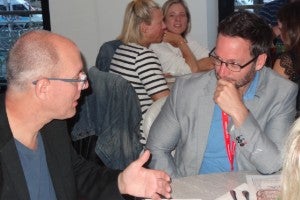
Faculty Tom Bancroft, left, and Chad Pelletier, right, shared their professional insight with students at Cannes.
Student Natane Dillahunt says the experience of attending the Marché du Film provided valuable lessons.
“This trip has helped prepare me for the professional side of this world,” says Dillahunt. “I would say that this journey has helped me to step out of my comfort zone and has boosted my confidence level. I now feel better prepared to think on my feet without letting my nervousness control a situation.”
DeBorde is currently working on plans for the annual undergraduate film travel course to the 2020 Sundance Film Festival in January.
Lipscomb’s Department of Cinematic Arts provides real-world instruction and expertise to the students enrolled in this dynamic program. Undergraduate degrees are offered in animation (B.A., B.F.A.) and film production (B.A., B.F.A.), and a graduate program in film and creative media (M.A., M.F.A.). Film faculty are seasoned professionals with extensive credits who have helped train and send numerous students into successful careers in film and television.
— Photos submitted by Dave DeBorde